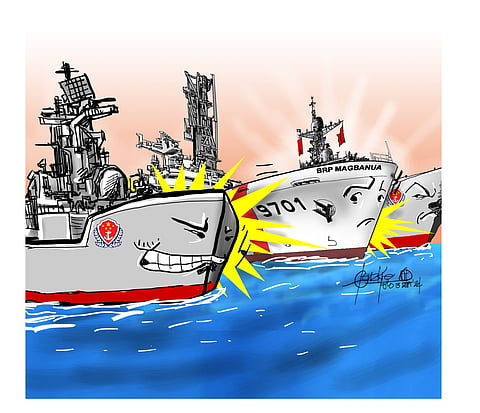
- NEWS
- the EDIT
- COMMENTARY
- BUSINESS
- LIFE
- SHOW
- ACTION
- GLOBAL GOALS
- SNAPS
- DYARYO TIRADA
- MORE

With China’s aggression toward the Philippines reaching a perilous level, recent events in the West Philippine Sea have thrown a dark shadow over the area. Not only was the BRP Teresa Magbanua’s ramming by a Chinese Coast Guard vessel at Escoda Shoal an act of provocation, it clearly attacked Philippine sovereignty and portends possibly more dangerous conflicts.
One wonders what China will do next as tensions climb. Will it intensify them by aiming at the commissioned Philippine Navy ship, the stationary BRP Sierra Madre, anchored at Second Thomas Shoal? Considering the Philippines’ Mutual Defense Treaty (MDT) with the United States, this type of action could turn the present standoff into a full-fledged military confrontation with the effects much felt beyond the disputed waters.
A possible attack on the BRP Sierra Madre would directly challenge the worldwide community and test the boundaries of world diplomacy and defense cooperation. Though rusty and crumbling, the Sierra Madre represents the Philippines’ consistent posture against Chinese expansionism.
China forcibly removing the Filipino troops stationed there could set off a shooting war, a possibility that might bring in the United States under the terms of its MDT with the Philippines. Such a rise might destabilize the whole area and finally compel Southeast Asian countries — which have so far stayed mostly quiet — to change their stance.
Commodore Jay Tarriela, spokesperson of the Philippine Coast Guard on WPS matters, has voiced his displeasure at the relative quiet among the Southeast Asian neighbors of the Philippines. ASEAN countries, he pointed out, have been especially quiet while the United States, Japan, Australia, and the European Union have often denounced China’s belligerent behavior.
Though not totally unexpected, this stillness is depressing. Nonetheless, Tarriela should consider that many Southeast Asian nations cannot overtly support the Philippines as they, too, have overlapping claims in the South China Sea, claims that run counter to those of both China and the Philippines. Their reluctance to tackle China head-on emphasizes the great differences among ASEAN and the strategic conundrum smaller countries trapped between the rising might of China and their longstanding relationships with Western powers must face.
Though ostensibly helpful, Taiwan’s denunciation of the ramming incident reflects its own complicated relationship with China. Taiwan’s protest of China’s “expansionist objectives” is more about challenging Beijing’s general claims of sovereignty, which include over Taiwan itself, than about outright solidarity with the Philippines. This emphasizes the complex character of the South China Sea conflict, in which reasons other than support for the Philippines can drive even the denunciation of China.
Likewise, Tarriela expressed worry about some Filipinos who seem to support China in this territorial conflict. This alarming trend captures China’s sophisticated approach to influence, which goes beyond diplomatic and military channels. China has been accused of offering financial incentives to change perceptions and narratives.
This fits a larger trend whereby China tries to discredit its enemies not just by direct conflict but also by spreading discord and uncertainty among their own people. Tarriela’s worries serve as a sobering reminder that the fight for the West Philippine Sea is being waged in the information and financial spheres, among several fronts.
Given this, the function of the national leadership becomes even more important. President Ferdinand Marcos Jr. exhorted Filipinos on National Heroes Day to respect the rule of law, protect their nation’s sovereignty, and live by democratic values. His speech speaks to a deep-seated need for national unity against outside challenges.
Particularly among the younger generation, the spirit of the Philippines’ heroes should be invoked as the country negotiates these challenging waters. Particularly among the younger generation who can be more swayed by globalized culture and economic pragmatism than by the historical struggles for sovereignty, there is a rising belief that the patriotic zeal that formerly marked the Filipino identity may be fading.
The call to action sounded by President Marcos is not only a symbolic gesture but a rallying cry for a country that has to now battle a new kind of colonialism — one that is sneaky and multifarious. Standing at the junction of geopolitics and history, the Philippines has to learn from its past to protect its present.
Heroes like Lapu-Lapu, Jose Rizal, and Andres Bonifacio left a living heritage, not just a historical record, that must be carried forward if the nation is to resist the expansionist intentions of the new bully of Asia — China.
Emulating the bravery and patriotism of the nation’s heroes will help Filipinos to guarantee that the past’s sacrifices are respected and the integrity of the country is maintained for the next generations.
